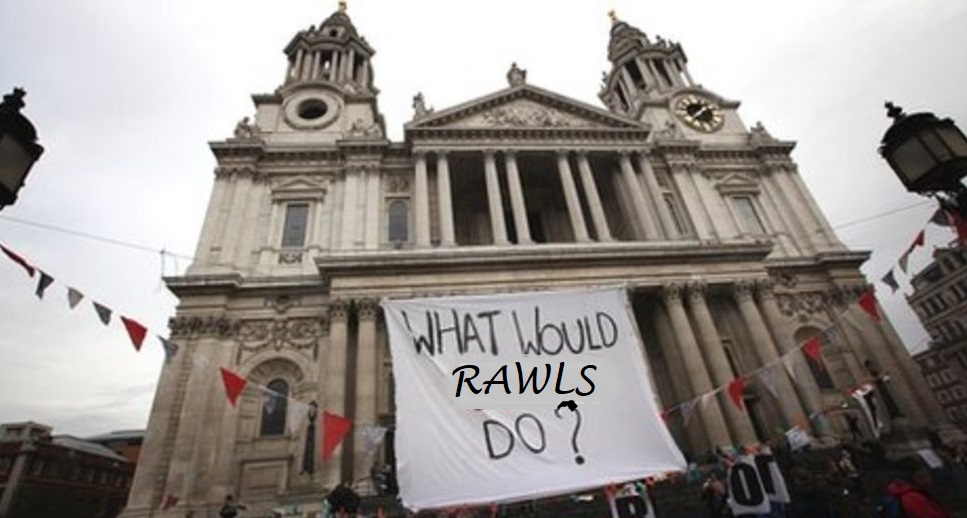
Daniel Chandler was introduced to John Rawls’ Theory of Justice during his history degree at Cambridge. Although I was encouraged to write a dissertation on Les événements de mai 1968 while studying for the same degree thirty or more years earlier, Theory of Justice, only published in 1971, hadn’t made it into Quentin Skinner’s “History of Political Thought” lectures when I attended them in 1976. Instead, my introduction came at Stanford University’s Graduate School of Business a few years later. By the time that I was involved in the Britain’s short-lived Social Democratic Party in the 1980s, Rawls’ theories, particularly his rationale for a just society being one which offers the most for the least well off in society, provided a philosophical justification those who defected to the SDP from a Labour Party wedded to “Clause 4” socialism.
Chandler and I share a huge respect for Rawls. Chandler takes this to the extent that Rawls’ theories become his lodestone for examining public policy. In the first half of his book, Free and Equal: what would a fair society look like?[1] Chandler performs a valuable service by providing a readable and accessible summary of John Rawls’ famously turgid and impenetrable book, along with an account and rebuttal of Rawls’ critics and of those such as Amartya Sen (a hero and, apparently, mentor to Chandler) who have built on Rawls’ foundations. But the second half of the book, which justifies the sub-title , leaves me imagining that Chandler either wears a leather bracelet imprinted with WWRD (like members of some Christian youth groups wearing one for “What Would Jesus Do”) or lives under a banner like that raised by members of the Occupy Movement at St Pauls Cathedral in 2011.
Chandler works his way through a wide range of public policy issues, trying to apply Rawls’s view of what constitutes social justice by setting out a collection of prescriptions for addressing social and global problems, such as income and wealth distribution, the environment, and distribution of power in the workplace. The attempt is admirable, but disappointing. While conveying the impression that emotionally he is politically on the left, he is resolutely a centrist and not afraid to challenge traditional leftist positions, probably reflecting his academic move from history to politics and philosophy, so less a slave to dogma that some who take on this challenge.
His cv includes Harvard and the LSE, the UK Prime Minister’s Policy Unit, the Resolution Foundation and the Institute for Fiscal Studies, but his prescriptions and supporting accounts lack grounding, are uniformly derivative, and feel embarrassingly like the work I was turning out as a student politician and parliamentary researcher in my late teens and early twenties. Given his background, he can’t be blamed lacking the grounding in the real world that might have informed an approach that would be both more nuanced and insightful. His account of ownership and power in the context of the firm is particularly disappointing and falls into the trap of believing that the shareholders generally hold the power rather than the managers, and the power of different stakeholders depending on the characteristics of the particular markets in which the firm operates, may have more or less power[2]. The consequence is a very simplistic set of prescriptions, with nothing particuarly original.
I briefly found myself bothered by the utopianism that underlies the ambition for the second half of the book, but then cames across his own apology for this and explanation of the need for ambition to make the world a better place, and the value of Rawls’ ideas about justice in thinking about what constitutes “better”. I was then reminded of Lenin, writing in the fifth chapter of What is to be done? Where he cites 19th Russian nihilist Pisarev
“the rift between dreams and reality causes no harm if only the person dreaming believes seriously in his dream, if he attentively observes life, compares his observations with his castles in the air, and if, generally speaking, he works conscientiously for the achievement of his fantasies. If there is some connection between dreams and life then all is well.”
before then observing
Of this kind of dreaming there is unfortunately too little in our movement.[3]
So, full marks to Chandler for his account of Rawls, and also the aspiration to frame practical solutions in light of Rawls theory, even if he falls well short in his prescriptions and how be presents them.
[1] Chandler, D. (2023). Free and Equal. Penguin UK
[2] Ironically, I read his objection (page 262) to John Lewis Partnership being viewed as a co-operative “because workers do not exercise full control over management” on the very day that the John Lewis staff chairman Dame Sharon White lost a vote of confidence in her past performance from the Partnership Council although she received support for her future leadership going forward.
[3] Wikipedia. (2023). Dmitry Pisarev. [online] Available at: https://en.wikipedia.org/wiki/Dmitry_Pisarev [Accessed 10 May 2023].